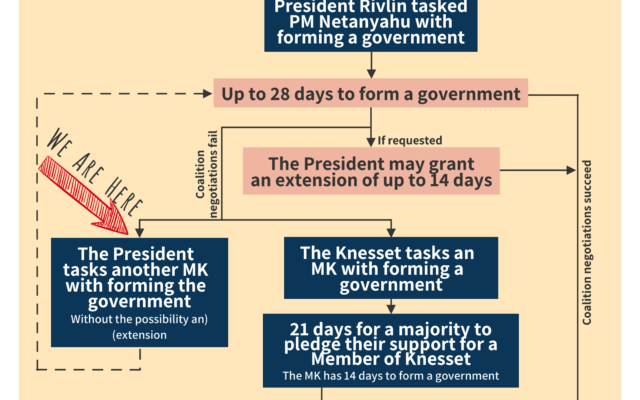Prime Minister Failed to Form a Government
Is it too early to declare the end of the Benjamin Netanyahu era?
Prime Minister Benjamin Netanyahu had 28 days in which to form a majority coalition government. He failed to do that. Whether or not this is the beginning of the end of the Netanyahu era, however, is still unclear.
Minutes before midnight May 4, Netanyahu returned the mandate he had received from President Reuven Rivlin. Fewer than 24 hours later, Rivlin handed the mandate to Yair Lapid, the head of the Yesh Atid party, and the second largest in the Knesset after Netanyahu’s Likud party. Lapid will now have 28 days, with a possible two-week extension, to succeed where Netanyahu failed: Forming a new government.

If Lapid also fails, Israel will head to the polls again, the fifth election since spring 2019. Political pundits state that is what Netanyahu wants. Meanwhile, he remains the head of a transition government, as he has over much of the last two years.
According to Yohanan Plesner, president of the Israel Democracy Institute, “Our latest data indicates that most Israelis are skeptical about any government being formed, with 70 percent thinking we’re headed to fifth elections in the coming months.” Israelis seem to be basing their predictions on experience.

In the second election of 2019, after Netanyahu failed to cobble together a majority of the 120 members of the Knesset to form a government, the mandate was handed over to Blue and White party leader Benny Gantz. Newspapers at that time started heralding the end of the Netanyahu era. Rivlin went so far as to call Netanyahu the “outgoing prime minister.” But Gantz also failed to produce a coalition government and the country went to its third election.
That election yielded a so-called unity government led by Netanyahu and Gantz, focused on fighting the pandemic and resulting economic chaos. But that government also failed, leading to the March elections, the results of which ended in another stalemate.

Anshel Pfeffer, who writes for the Israeli newspaper Haaretz, said it is “a bit premature” to say that the Netanyahu era is ending. However, if he is replaced as prime minister, Pfeffer acknowledged that it would be a “massive event…a pivotal moment,” but it wouldn’t “be the end of Netanyahu by any account. He will not be resigning as leader of Likud. He will be greatly diminished, but he will do everything he possibly can to get back into that office.”
It is an office that Netanyahu has filled longer than any other Israeli, serving 15 years as prime minister. Dov Wilker, regional director of the American Jewish Committee in Atlanta, pointed out in an email to the AJT, “Netanyahu’s time as prime minister has, incredibly, spanned both the direct voting of PM (1996-1999) and the more traditional way (being the leader of Likud and being able to form a coalition government). Should a government be formed without Bibi as prime minister,” he said, using Netanyahu’s nickname, “it would mark a shift. But the government is stronger than just one person. It would also demonstrate the vibrancy of the Israeli democracy, which for students and people advocating for Israel, will be an additional item for people to consider.”

Indeed, in passing the mandate to Lapid, Rivlin addressed “fellow Israelis,” saying, “We have been caught in a maze – if not a political crisis – for some time now. But we must not allow these difficulties to undermine our faith that we are on the right path and that we can continue to build the sovereignty of the Israeli people here.”
In accepting the mandate, Lapid wrote that “after two years of an endless political nightmare, Israeli society is reeling. The unity government is not a compromise – it is the objective.”
Putting together his coalition will still be a challenge. According to Israeli press, Lapid will allow Naftali Bennett, chairman of the right-wing Yamina party, to fill the prime minister’s seat for the first two years, then rotate to Lapid – assuming the government lasts that long.

Bennett had been seen as the kingmaker of the next government, even negotiating to join a Netanyahu-led government. Enticed by the premiership, Bennett also wanted to avoid another election, which he told The Times of Israel would “simply destroy the country.” He said he was willing to join a “broad emergency government…that will get the wheel out of the mud.”
The coalition is expected to include right-wing parties such as Bennett’s Yamina party, Yisrael Beytenu and the New Hope party, center parties such as Blue and White and Yesh Atid, as well as left-wing parties such as Labor and Meretz. It is unclear whether any Israeli Arab parties would help form the new government.
Negotiations between the disparate parties about the division of roles in the various ministries in the government had already begun before Lapid received the mandate to form the next government.
- Jan Jaben-Eilon
- Benjamin Netanyahu
- Israel elections
- Israel
- President Reuven Rivlin
- yair lapid
- Yesh Atid
- Likud Party
- Knesset
- Yohanan Plesner
- Israel Democracy Institute
- Blue and White party
- Benny Gantz
- Anshel Pfeffer
- Haaretz
- Dov Wilker
- American Jewish Committee
- naftali bennett
- The Times of Israel
- Yisrael Beytenu
- News




comments